By LISA EISENHAUER
Until the COVID-19 pandemic hit, Dr. Bilal Naseer used his expertise as an infectious disease specialist and a critical care physician to treat his patients and advise his colleagues within the CommonSpirit Health system.
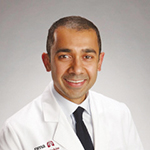
Naseer
In the months since the virus began to rage out of control, he has been sharing his knowledge on a much wider scale. On behalf of his health system, he has given interviews to local media and to major news organizations including the Los Angeles Times and The Wall Street Journal, fielding questions about why the virus is spreading and how best to control it.
"I was a little bit reluctant, but once I spoke to one journalist, I realized that it actually is really good for the public and the journalists to hear directly from the doctors who are managing patients," says Naseer, who is based at Mercy San Juan Medical Center in suburban Sacramento, California.
Naseer is among many care providers from Catholic health systems who are stepping in front of news cameras and answering queries from reporters in hopes of helping the public better understand and respond to the threat posed by the pandemic.
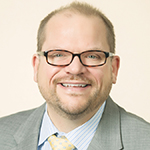
Nelson
Myth busting
Ken Nelson, chief nursing officer for HSHS St. Vincent Hospital and HSHS St. Mary's Hospital Medical Center, both in Green Bay, Wisconsin, is a veteran of the media spotlight. He talks to reporters fairly regularly during flu season about the danger of the viral scourge and the importance of getting a vaccine annually.
In the last year, demand from news organizations for his time and knowledge has spiked. He's talked about COVID and its seesawing impact on his hospitals with reporters from local and statewide TV stations and newspapers and he was featured in a film clip shown on ABC's "Good Morning America."
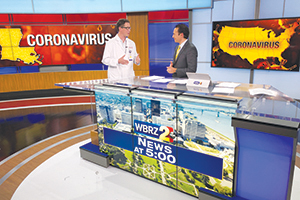
Dr. Christopher Thomas, medical director of quality and patient safety at Our Lady of the Lake Regional Medical Center in Baton Rouge, Louisiana, explains public health recommendations to slow the spread of COVID-19. His appearance on a local TV newscast in March was one of many interviews he’s given on the topic.
He makes it a point to bring up the trauma that the pandemic is wreaking upon patients and their families and on health care workers.
"As part of being a nurse and being in health care, I believe that we really need to make sure that the public is aware of what's going on, what could happen," and the truth and falsehoods behind popular health beliefs, myths and urban legends, Nelson says.
Gratitude and prayers
Another motivation for his making himself available for news interviews is to pull the discussion away from the political realm, where advice about how to respond to COVID has not always been science-based. He wants the public to be aware that their own behavior affects the virus's spread.
"Honestly, COVID-19 is not a political problem or issue. It's not even necessarily a health care problem or issue. It's a community issue. It's a community problem," he says. "It's really going to take the community, working together, to help to solve it."
Nelson says he knows that his words are reaching a wide audience because of the feedback he gets. That feedback comes in many forms, including personal emails, reader comments posted to news stories in which he is quoted, and letters sent to the two Hospital Sisters Health System hospitals where he works.
"I've received letters from all over the country, believe it or not, from people who have heard our story, and have just reached out with offering prayers, offering gratitude, people that don't have any ties to this community," he says. "I was very surprised that that happened."
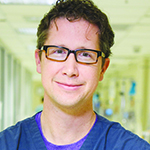
Thomas
Pandemic point person
Dr. Christopher Thomas is also something of an old hand at fielding media inquiries. As medical director of quality and patient safety at Our Lady of the Lake Regional Medical Center in Baton Rouge, Louisiana, and a specialist in critical care, he's been tapped by the hospital's communications team many times to talk to reporters on medical topics.
His expertise has never been in as much demand as it has been since the rise of COVID and especially since Louisiana became one of the pandemic's early hotspots in March. At one point, he and his colleagues were taking turns making appearances on a local TV station several times a day to keep the public in the loop about the extent of the emergency.
He's talked to The Washington Post and The Wall Street Journal about the strain the pandemic has put on his hospital and he's stood beside Gov. John Bel Edwards at a press conference urging public vigilance to keep the virus from spreading.
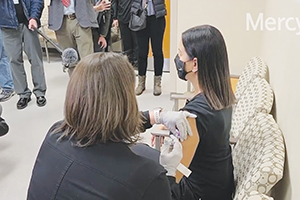
Dr. Aamina Akhtar gets the second dose of her COVID-19 vaccine in January. As an infectious disease specialist, chief medical officer at Mercy Hospital South in suburban St. Louis and a woman of color, Akhtar welcomes news coverage to set an example that the vaccine is safe. She is seen here in a Mercy video.
Thomas has shared his insight about the evolving pandemic with staff and the community in internal and social media postings and in his news media appearances. He has been one of three point people within the medical center writing dynamic guidelines for pandemic response based on patient load, community incidence and reports from medical journals and information from the Centers for Disease Control and Prevention and other health agencies.
Thomas says he has at times felt the same frustration that other medical professionals have expressed over the absence of a unified message about the pandemic from public officials. His hope is that his postings and appearances have helped present the medical community's best advice and set an example for why medical and scientific advice should be the guide during any similar crises in the future.
"I would like to see the public say, 'If it's a public health issue, I want to hear from the health professionals to tell us what to do,'" Thomas says. And then he would like the government to take its cues on how it responds from medical experts.
Who better to lead?
Dr. Aamina Akhtar, an infectious disease specialist, was relatively new to her job as chief medical officer at Mercy Hospital South in suburban St. Louis, when the pandemic began to ravage the globe. "Within the first six to seven months of my new leadership role, here comes a crisis," she says, adding her appointment was serendipitous. "Who's better prepared to help lead through some of this" than an infectious disease specialist?
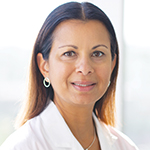
Akhtar
She's sharing knowledge and best practices regarding COVID across the Mercy system through email, Webex and other internal platforms. Even as the pandemic has stretched her hospital to crisis capacity, she has routinely granted interviews to local media to discuss the steps the hospital is taking to address the emergency and to urge the public to adhere to basic precautions like masking and social distancing to avoid contracting or spreading the virus.
While she is willing to have a high profile in the pandemic in order to share her medical knowledge, Akhtar says the fact that she is a person of color is also a motivating factor. She thinks that people are more accepting of medical advice if it comes from professionals who share their gender and race. "I think what's important is when we deliver messages to the community, whether it's about health care or anything, people want to be able to relate," says Akhtar, who emigrated from Pakistan with her family as a child. "And so, I think by bringing in diversity, that is an additional asset."
As the pandemic dragged on in late 2020, Akhtar was eager to get a COVID vaccine so she could set an example both at the hospital and in the community for anyone worried about the vaccines' safety, of which she is confident.
"Anytime we are speaking about medical issues and we have patients or family members or co-workers who have concerns about a process, whether it's the vaccine or mask wearing, I think we have to be compassionate to understand that their questions and concerns are always legitimate," she says. "We have to be able to find the right means to answer those questions honestly and continue to be an advocate for what keeps our patients and our community safe."